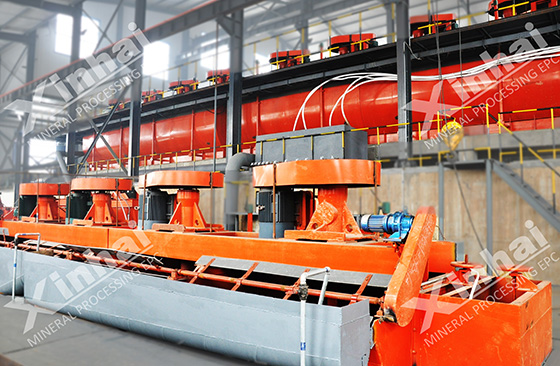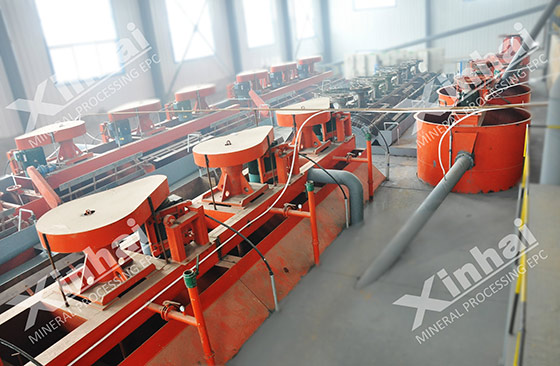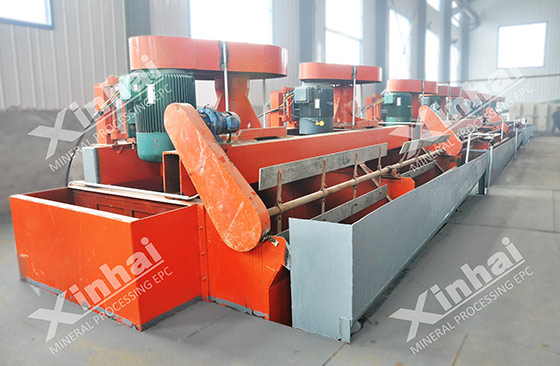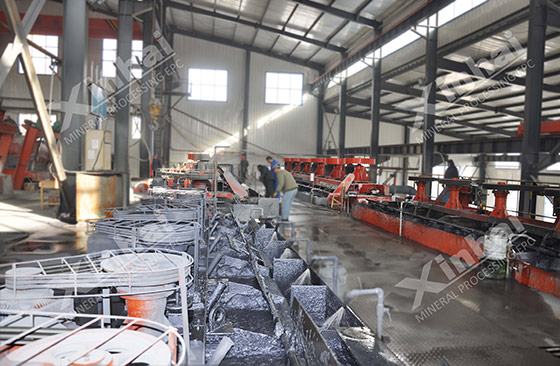
Molybdenum is a good conductor of electricity and heat because of its high melting point, boiling point, hardness and density. It is often used in the production of alloy additives, stainless steel, tool steel, temperature-resistant steel, etc. According to the excellent natural floatability of molybdenum ore, flotation method can be selected for treatment. With the continuous development of mineral processing technology, the production scale of the processing plant continues to expand, which promotes the continuous development of flotation technology and equipment. The following will introduce you to the flotation process of molybdenum ore and commonly used flotation equipment.
Molybdenite has good natural floatability due to its layered structure. Therefore, flotation is mainly used to select molybdenite. Molybdenite flotation usually uses non-polar hydrocarbon oils such as kerosene and diesel as the collector, and pine alcohol oil as the foaming agent for flotation. If only the foaming agent is added during flotation, the concentrate can also be flotated.

Generally, molybdenite raw ore is crushed and ground to a suitable particle size, and qualified molybdenum concentrate can be obtained through rough selection and several selections. However, molybdenite is soft and easily adheres to the surface of gangue mineral particles during the grinding process, easily causing over-crushing. In addition, due to the good natural floatability of molybdenite, even if the particle size reaches 0.6mm, as long as 1% of the molybdenite is exposed on the surface, it can float out smoothly. This will easily cause gangue minerals to enter the concentrate and reduce the concentrate quality. Therefore, molybdenum ore beneficiation often adopts the process of coarse grinding and rough selection. The coarse concentrate produced by rough selection will be returned to the grinding system for re-grinding to fully dissociate it, and then be refined, that is, using stage grinding, stage selection process.
According to the working principle, flotation equipment can be roughly divided into three categories: mechanical flotation equipment, flotation columns, and reactor/separator flotation equipment. Mechanical flotation equipment is equipped with a stirrer, while flotation columns are flotation equipment without mechanical agitators.

1. Application of mechanical stirring flotation machine
Mechanical agitation flotation machines can be divided into two types according to different aeration methods: mechanical agitation self-aspirating type and mechanical agitation aeration type. The difference between these two flotation machines lies in the different inflation methods. The self-aspirating flotation machine sucks air into the pipeline through the negative pressure generated by the rotation of the impeller. The air enters the slurry through the pipeline, thereby completing the flotation inflation process. . The inflatable flotation machine relies on an external fan to inject air for flotation. Compared with the gas-filled flotation machine, the disadvantage of the self-aspirating flotation machine is that the aeration volume is insufficient and the flotation efficiency is lower.
2. Application of flotation column
The basic structure of a flotation column is roughly a cylinder at the top and a cone at the bottom. An inflator is installed at the connection between the cone and the column. The slurry is fed from the upper part, and the air enters the inflator through the annular air chamber and the inflation duct. The bubbles entering the slurry from the inflator spread evenly along the entire section of the cylinder, and slowly rise through the downward flowing slurry. During this convection process, particles and bubbles collide and come into contact, allowing bubbles to selectively adhere to particles. The particle-carrying bubbles rise to the liquid surface and gather to form a foam layer, which overflows or is scraped out to obtain the hydrophobic product. The hydrophilic particles and slurry are discharged from the bottom of the column together.

The characteristics of the flotation column separation process are: ① Since air is supplied by an external compressor and passes through the aerator, a sufficient amount of air can be ensured to enter the slurry, and the bubbles can be dispersed evenly.
② The operation control of the flotation column is achieved by regulating the air volume, so the air volume has a great influence on the work of the flotation column. ③The aerator is a key component of the flotation column, which directly affects the amount of aeration, the degree of bubble dispersion and the working efficiency of the flotation column.
Compared with traditional flotation machines, flotation columns have the following advantages: such as easy control of foam layer thickness, bubble size, bubble number, etc., and simple flotation process. Generally, it takes 8-12 times to use a flotation machine in the molybdenum beneficiation stage, while it only takes about 3 times to use a flotation column. The environment in the flotation column is better for the dynamic collision of bubbles and ore particles and the static separation of the bubble-particle combination. , which is beneficial to the separation of fine-grained or micro-grained molybdenum ore; the flotation column is easy to realize automatic control, so it is more suitable for the separation of molybdenum ore.

At present, the flotation equipment in molybdenum ore concentrators is still mainly mechanical stirring flotation machine. In the roughing and sweeping parts, the inflatable mechanical agitation flotation machine is mainly used, and in the selection part, the self-aspirating mechanical agitation flotation machine is mainly used. Some large mineral processing plants have begun to successfully apply flotation columns in industrial production and have achieved good technical and economic indicators. The flotation column is more suitable for use in the selection part, which can effectively improve the grade of molybdenum concentrate and the metal recovery rate.
To find out more about our products and solutions, please fill out the form below and one of our experts will get back to you shortly.